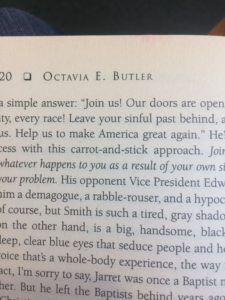Leading into reading this novel, I was internally struggling with how I was going to get through this class. I am not a fan of science fiction, and the syllabus felt overwhelming, especially when considering the entire class was centered around science fiction novels. However, since the first chapters (Past 1, etc.) I have been extremely interested in the narratives that Butler has created.
I have found myself becoming immersed in the reading, and not wanting to put it down after I had finished the sections assigned for each class. I often found myself conflicted with the ideas of how I felt I should have been feeling based off of the things we discussed in class, such as the concepts of consent and humanity. In a way, I often found myself being disturbed because I was more comfortable with the super-natural beings in the enclave who often defied the laws of consent and “ruined” so many peoples’ lives and I found myself annoyed and uncomfortable with other characters such as Blake. Why am I finding myself being more accepting of these characters that are so destructive in their ways and wishing those who are victims of these people to disappear? I am interested in the ways that Butler’s future novels that we read will lead me to conflicting feelings once again.
My first impressions of this class were clearly wrong, and I’m happy to have found another English class that leads me to think about class discussions and the themes in the books we read long after I have left the class. It also doesn’t hurt that I look forward to reading in between classes.

